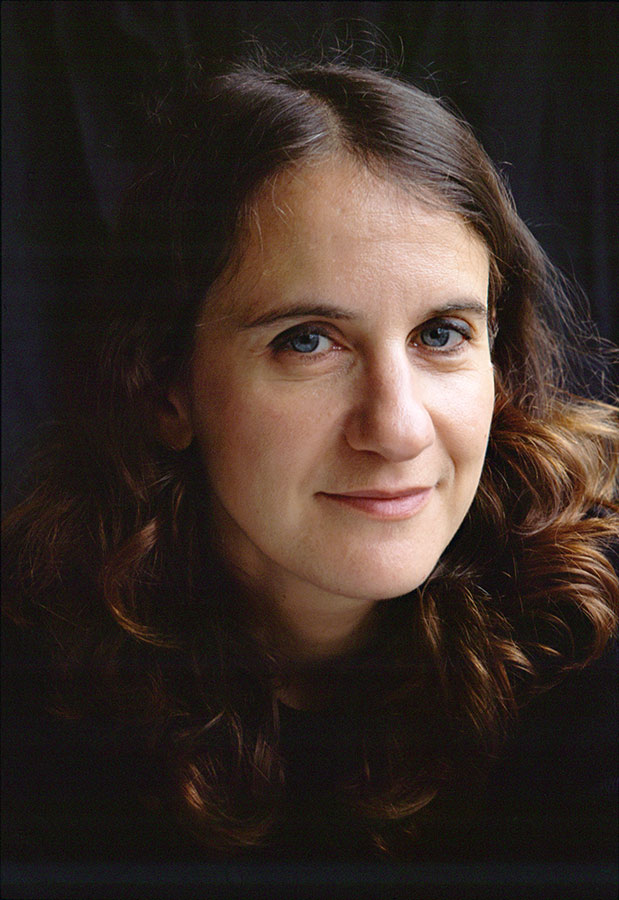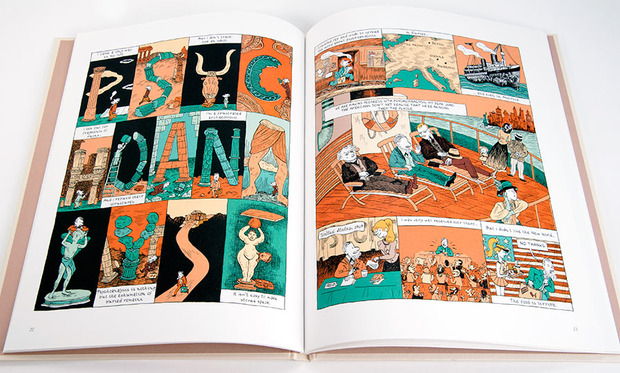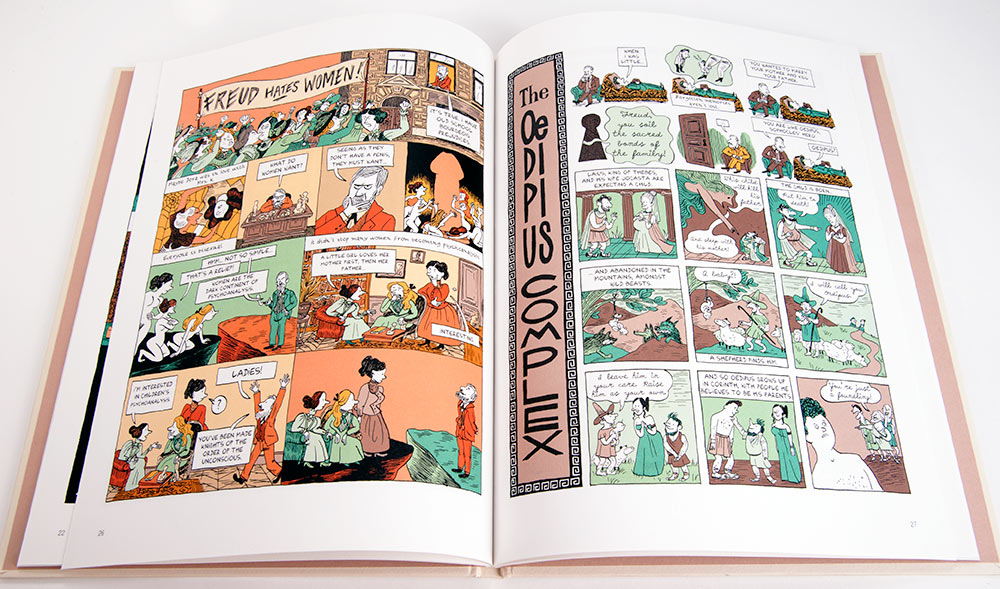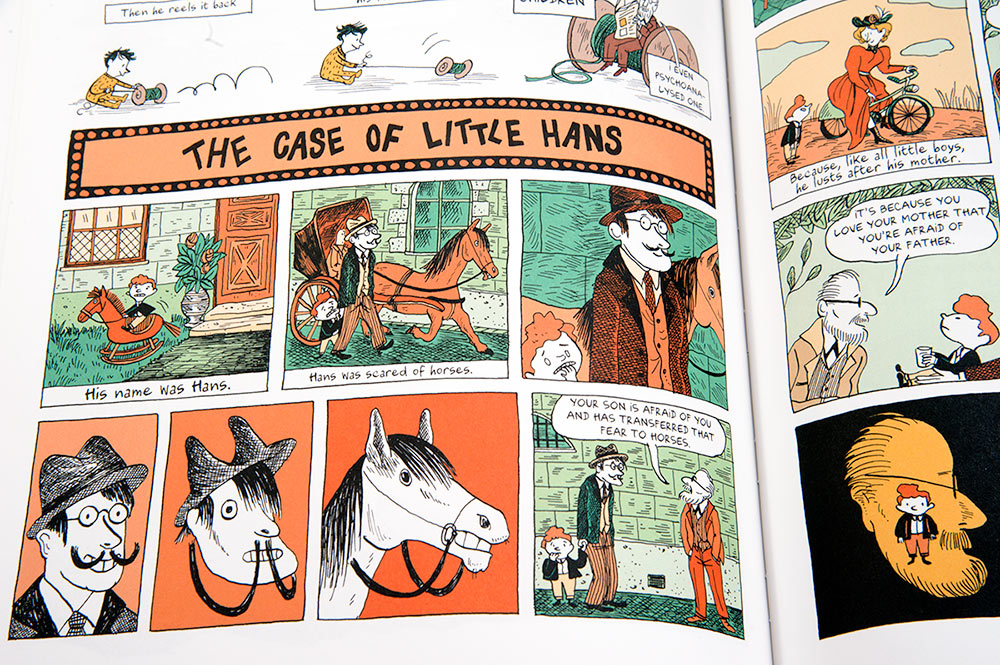Interview: Corinne Maier
The controversial French author behind “No Kids” and “Hello Laziness” on her newest book—a biography of Sigmund Freud told through comics



Corinne Maier—a French psychoanalyst with a background in economics and international relations from the prestigious Sciences-Po in Paris—also happens to be a best-selling author. Out of the 15 or so already under her belt, her two most controversial books encouraged readers not to have children (“No Kids“) and to unobtrusively slack off at their corporate job (“Hello Laziness“).
Maier’s newest nonfiction book, however, won’t be igniting mobs of angry parents or corporate managers. “Freud” is a biography told through comics and an homage to the influential yet often misunderstood father of psychoanalysis, Sigmund Freud. In the past, Maier has written books on a variety of renown figures such as Charles de Gaulle, Louis Pasteur and even Casanova. For “Freud,” she collaborated with the young French artist Anne Simon; taking on the difficult endeavor of retelling Freud’s life within 56 illustrated pages—and in layman’s terms.
Simon’s illustrations seamlessly transition between the real and the surreal. For example, on one page, Freud is eating a typical Austrian-style lunch and on another, she portrays Freud’s use of psychedelics by having him ride a phallic mushroom and falling down using a brain-shaped parachute. It’s the illustrations that catapult the reader headfirst into the inner workings of Freud’s mind, but don’t be fooled by the pictures—”Freud” was not written for children. Rather, it’s the perfect introductory book for those of us who have constantly heard “Freud” name-dropped over and over, but were too apprehensive to go any deeper or ask questions. Maier’s penchant for wittiness (Freud: “Reproduction. Isn’t that the most commonplace form of immortality?” or “I love Vienna. They say it’s a city with semen in the air.”) balances the darker themes of repressed sexual desires to misogyny to Freud’s personal struggles experiencing war and cancer towards the end of his life.
We spoke with Maier for insight into her own mind and her thoughts about Freud in the 21st century.

As a psychoanalyst yourself, how were you taught about Freud? Did you challenge his ideas as a student?
No, not at all. As a student, I studied political sciences, economy and history. Freud was not part of the program, unfortunately. When I began to read Freud, I had already finished my degrees in university. I was already 22 years old when I first read “Moses and Monotheism”—a book that I found astonishing. Later in my life, I attended seminaries in the field of psychoanalysis, and of course read the “Œuvres complètes” [complete works] of Freud.
The color theme of the book is quite interesting; it stays mostly green, orange and brown. Are these related to Freud at all?
Anne chose the colors herself, and she felt free to do so. She is the artist, I am the intellectual. This is the way we collaborate—I exaggerate a little bit, of course. It is connected to the pictures Anne has seen, and to the general atmosphere of old-fashioned Vienna—as she imagined it. I love Anne’s work. We have worked together on another graphic novel, “Marx” (that will be published very soon by Nobrow, too), and the colors Anne chose are of course different—there is obviously a lot of red.

“Freud” isn’t a traditional biography in the sense that it’s not just a straight timeline of events. How did you decide to set up the unique storyline that jumps back and forth between historical events, his case studies with clients, to retelling Greek myths like Oedipus, etc.?
Freud spent 70 years of his life in his office, working. There is obviously a lack of action… So we chose a storyline that mixes up his discoveries and his life, in order to be interesting for the reader.
What do you think are the most common misunderstandings about Freud?
The first one is to think that the message of Freud is to give us happiness. The second is to think that there are universal keys that apply to everybody. For example, in order to understand dreams: To say that a staircase means success—it would be so simple! It all depends on the context, on the dreamer, etc.

How can psychoanalysis be applied to current economic or political issues today?
Psychoanalysis gives precious insights about economy and politics. In fact, it was the subject of my thesis. I wrote in 1999 a Lacanian commentary (Freud+Lacan) of the “Memoire de guerre” of the General [Charles] de Gaulle. Psychoanalysis helps give fresh and new approaches of texts, events and famous historical people.
Did Freud’s works have any influence on your past writings, such as “No Kids” or “Hello Laziness”?
It did. But not in a direct way. Of course, these two books are not Freudian at all. But it is a way to tell people, “Escape conformism, don’t believe in ready-made happiness, you have your own life to invent.” To me, one of the aims of psychoanalysis is to try to think by oneself.

At the end of the book, you “revive” Freud from the dead. He says, “Looks like the 21st century still needs me.” Do you think his influence is slowly decreasing today?
I think a lot of people know something about Freud, but at the same time we all need to read his work over and over again. His work is so often quoted and used (sometimes misused) that we tend to forget that his thoughts are still useful for us. No, Freud is not just an old-fashioned gentleman at the beginning of the 20th century. He is modern, and his texts are connected to our contemporary life—the issues he raised (about sexuality, about the purpose of life, for example) are still very important. And he is witty. He is much more than a statue in an European garden! That is why, Anne Simon and I, we had great fun trying to make him move and talk.

Who would be the next great thinker you would like to write about? Perhaps a woman?
I’d love to write a graphic novel about Hannah Arendt. She is one of the leading political thinkers of the 20th century. Jewish, she was born in Germany, and in the year 1920 she had a love-affair with Heidegger, a German philosopher who supported the Nazis. I think this incredible story sounds a bit like the biopic of a Hollywood film.
“Freud” is available for purchase from Nobrow Press for $20.
Portrait by Ewa Rudling, all other photos by Nara Shin











